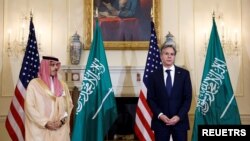Blinken landed in the Red Sea city of Jeddah on Tuesday evening for a planned meeting with Saudi Arabia's de facto leader Crown, Prince Mohammed bin Salman.
A U.S official said Blinken will head to Riyadh Wednesday for a Gulf Cooperation Council meeting.
The goals of the U.S. Secretary of State's trip include regaining influence with Riyadh over oil prices, fending off Chinese and Russian influence in the region, and nurturing hopes for an eventual normalization of Saudi-Israeli ties.
Blinken's three-day visit will also focus on efforts to end conflicts in Sudan and Yemen, and the joint battle against the Islamic State group (IS).
The top U.S. diplomat's June 6-8 visit to the world's largest oil exporter comes days after Riyadh pledged to further cut oil production, a move likely to add tension to a U.S.-Saudi relationship already strained by the kingdom's human rights record and disputes over America's Iran policy.
Discouraging a closer Saudi-Chinese relationship is probably the most important element of Blinken's visit, said Richard Goldberg, senior adviser at Washington-based think-tank, the Foundation for Defense of Democracies (FDD).
"[Blinken should explain] why Chinese interests do not align with Saudi Arabia, and why closer relations in a strategic way inhibit closer relations with Washington," Goldberg said.
U.S.-Saudi ties were off to a rocky start in 2019 when President Joe Biden during his campaign said he would treat Riyadh like "the pariah that they are" if he was elected, and soon after taking office in 2021, released a U.S. intelligence assessment that MbS approved the operation to capture or kill journalist Jamal Khashoggi in 2018.
A visit by Biden in July 2022 to the kingdom did little to ease tensions, and increasingly, Riyadh has looked to reassert its regional clout, while growing less interested in being aligned with U.S. priorities in the region.
The most recent example was when MbS gave a warm embrace to Syrian President Bashar al-Assad at an Arab League summit in May, which saw Arab states re-admit Syria after a decade of suspension, a move Washington said it neither supported nor encouraged.
"There is just a tremendous amount of work that we're trying to do," a US State Department senior official dealing with Arabian Peninsula affairs, Daniel Benaim, said before Blinken's departure from Washington.
"We're focused on an affirmative agenda here and the great deal of work our countries can do together."









Forum